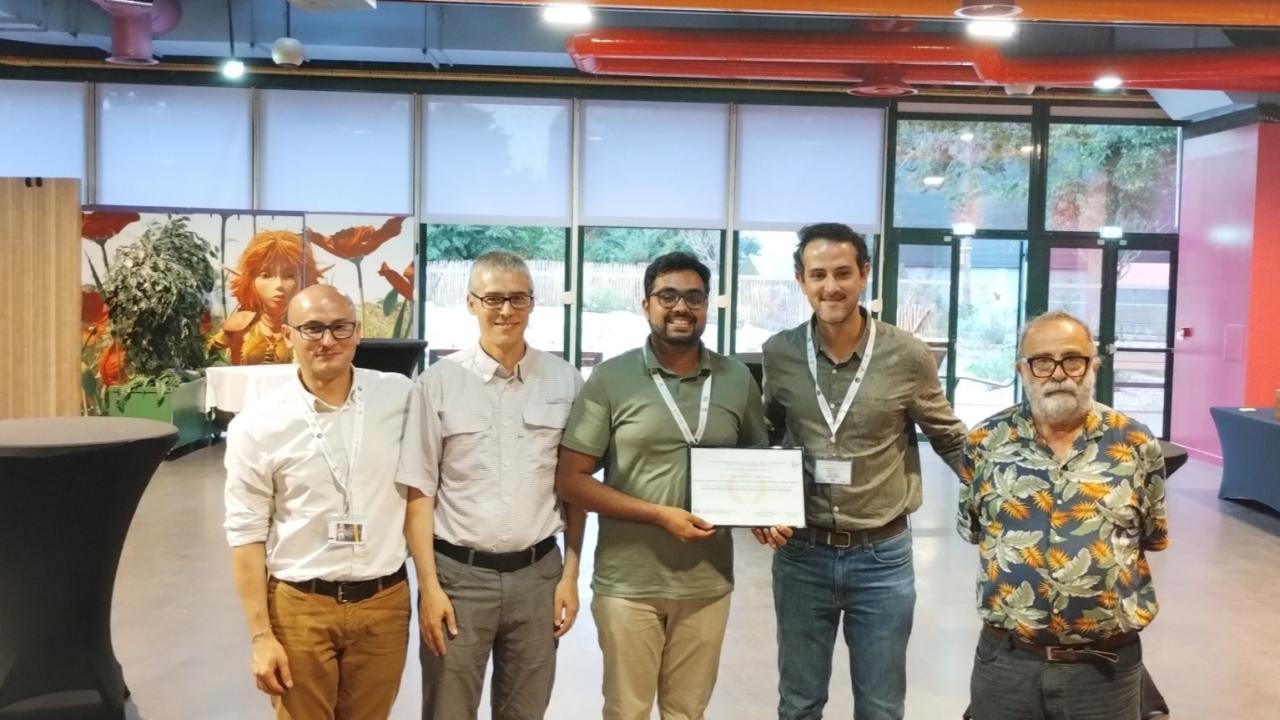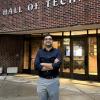Two graduate students from Purdue Polytechnic’s School of Engineering Technology took home the top two awards for medical application papers at the recent International Workshop on Medical and Service Robots (MESROB2025) in Poitiers, France.
Sukesh Jagannathan and Mauricio Fernandez-Montoya, both researchers in Professor Milton Aguirre's lab, won the gold and silver awards respectively for their work on two distinct, advanced walking canes designed to improve mobility and user health.
Jagannathan’s gold-winning paper detailed a cane inspired by the design of high-performance prosthetic legs. The project rethinks the fundamental structure of the walking cane to make it more responsive to the user's natural gait.
"Our cane design incorporates a nonlinear spring that becomes 'stiffer' and 'softer' at different phases of the gait cycle: heel strike, mid-stance, and toe-off," Jagannathan explained. "The result is a mechanically 'smart' cane that passively adjusts as you load it, absorbing shock during the initial impact, providing support in mid-stance, and returning energy near toe-off, all without the need for electronics or added weight."
Fernandez-Montoya’s silver-winning paper focused on a cane that uses haptic feedback and data acquisition to help users apply the correct amount of force, which is critical for physical therapy and rehabilitation but often difficult for users, especially the elderly, to gauge on their own.
"The problem is, in general, users are not aware of this force," Fernandez-Montoya said. "Using vibrations and sounds, we can inform the user when an appropriate force is applied or not. The cane also sends its orientation in space—rotations, accelerations—data that we theorize can be used to detect gait anomalies or incorrect walking techniques."
For both students, the international recognition was a powerful validation of their work.
"As a graduate student, receiving the MESROB gold award... is profoundly uplifting for me," Jagannathan said. "This recognition highlights the meaningful work being done by Dr. Aguirre’s group in the Social Impact Engineering Design Lab, where we strive to make healthcare technologies more accessible through human-centered design principles."
Fernandez-Montoya, who transitioned to assistive technology after a decade of designing electric vehicles and solar systems, saw the award as confirmation of his new path. "Designing for people is a whole new world," he said. "This award was confirmation from the scientific community that science and technology should have a real-world purpose, and simple designs, such as this smart cane, can still have a significant impact."
Looking forward, the researchers see this technology as a way to create tools that empower both patients and healthcare providers. "We are not replacing caregivers, specialists, doctors, or therapists, but instead creating tools to help them track users' recovery or injury evolution in real-time," Fernandez-Montoya added.
Additional information
- Gold Award Paper: "Nonlinear Stiffness Walking Cane Inspired by Prosthetic Leg Design"
- Silver Award Paper: "Bi-modal Haptic Feedback Walking Cane with Dynamic Data Acquisition"


